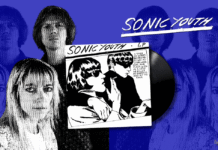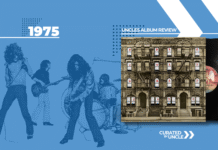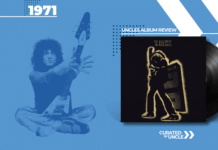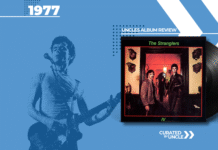Welcome to the Modfather’s Middle-Aged Renaissance
By 1995, while most of Britpop was still deciding which Blur vs. Oasis T-shirt to wear, Paul Weller was too busy writing the soundtrack to their midlife crises. Stanley Road isn’t just a Britpop record, it’s the moment dad finally took off his tie, bought a Fender and proved he still had it.
This was Weller charging back into the spotlight – not with the youthful angst of The Jam or the slick soul leanings of The Style Council, but with a battle-hardened blend of rock, R&B and introspective grit. He’d lived through punk, Thatcher, synths, acid jazz and the rise of Blur and instead of adapting, he simply stood still and let everyone else orbit him. In doing so, Stanley Road doesn’t sound like anything else from ’95, it sounds like Weller being Weller, armed with a Telecaster and a point to prove.
I remember playing this album at my mate’s flat the day after we’d been thrown out of a pub for loudly debating whether Weller was a genius or just had a good tailor. This album ended that argument. It’s soulful, snarling and surprisingly tender in bits. In short, it’s Weller doing Weller better than ever.
Table of Contents
Who’s Behind the Vintage Swagger?
- Paul Weller – vocals, guitars, piano and unflinching belief in himself as Britain’s musical conscience.
- Steve White – drums, Weller’s longtime rhythmic right-hand man.
- Brendan Lynch – producer and sonic alchemist.
- Steve Cradock (of Ocean Colour Scene) – guitar, bringing a lad-rock glint to the modfather’s mood swings.
- Noel Gallagher – yes, that Noel – lends a hand on “I Walk on Gilded Splinters.”
A mix of reliable hands and Britpop royalty, crafting something timelessly British but not stuck in the past.

How It Was Made: Soul Sweat and Studio Smoke
Stanley Road was recorded at the Manor Studio in Oxfordshire, a lush escape filled with vintage equipment and the ghosts of prog rock past. Brendan Lynch returned from Weller’s Wild Wood sessions to co-produce, helping shape an album that’s both raw and sophisticated. You can almost hear the warm hum of analogue tape and the smell of ageing leather.
Weller drew inspiration from his personal photo albums, childhood memories and record collection. The result? A melting pot of soul, rock, jazz and R&B filtered through the lens of a man who’s seen trends come and go and refused to wear any of them unless they fit.
Track by Track: Grit, Groove and Glory
1. The Changingman
A defiant opener that roars with wah-soaked guitars and lyrical venom. Weller tackles the idea of transformation with the subtlety of a brick through a stained glass window. I remember hearing this blasting from my brother’s bedroom it sounded like a revolution wearing suede boots. It’s urgent, stylish chaos with the swagger of a man who’s burned the map and gone off-roading.
2. Porcelain Gods
Here, Weller channels his inner preacher, decrying false idols with a gospel swagger. It’s musically rich—thick organ lines, simmering tension and the fury is palpable. I think it’s one of his most underrated takedowns, wrapped in a cloak of groove. Like a sermon delivered in a smoky club, it makes disillusionment sound downright anthemic.
3. I Walk on Gilded Splinters
A brooding, psychedelic swamp crawl featuring Noel Gallagher lurking in the shadows. It’s a cover of Dr. John’s track, but Weller makes it his own with jagged edges and hypnotic tension. This isn’t a polite homage, it’s a seance with a Telecaster. One of those rare covers that feels like it’s summoning something rather than copying it.
4. You Do Something To Me
One of those songs that somehow feels deeply personal even if you’re not sure why. It’s gentle, reflective and heartbreakingly restrained. I remember once hearing this in a pub and watching three people cry into their pints. That’s power. It’s romance tinged with regret, Weller at his most emotionally naked.
5. Woodcutter’s Son
A punky flashback that sounds like it could’ve punched its way off a Jam B-side. It’s quick, urgent and doesn’t overstay its welcome. In my opinion, this is Weller reminding the Britpop crowd who invented biting social commentary. It’s rough-edged rebellion served on a silver platter of distortion.
6. Time Passes…
A mid-tempo lament that’s far more moving than it has any right to be. The reflective lyrics and languid groove make you feel like you’re watching your own life in sepia tone. Not quite depressing, just… truthful. It’s the kind of song you don’t realise you needed until it’s halfway through and you’ve stopped what you’re doing.
7. Stanley Road
Autobiographical to the core, this track is Weller’s open letter to his younger self. The lyrics are vivid, nostalgic and tinged with both affection and regret. I think this is the album’s beating heart- sentimental but never syrupy. It’s one man tracing his own fingerprints across the map of memory.
8. Broken Stones
Smooth, jazzy and a little philosophical, like a cup of tea spiked with existentialism. Weller croons about finding wholeness in a fractured world and I find myself weirdly comforted every time I hear it. It’s introspective without being indulgent, a thoughtful detour in an otherwise muscular album.
9. Out of the Sinking
This one glides more than it strides. It’s got a subtle funk undercurrent, Motown flourishes and a chorus that sticks to your ribs. For my money, it’s one of Weller’s most polished moments. The vocals ache just enough to feel real, without veering into melodrama.
10. Pink on White Walls
Disorienting, woozy and completely captivating. The guitars wobble like a hungover Sunday, while Weller’s vocals are caught somewhere between a whisper and a snarl. I still don’t know what it’s really about and I don’t want to. It’s a fever dream painted in watercolours.
11. Whirlpool’s End
A sprawling track that balances dread and catharsis in equal measure. It’s cinematic and slightly ominous, like the end credits of a film you’re not sure you understood. But it lingers. Definitely lingers. The fade-out feels less like closure and more like a door creaking open somewhere far away.
12. Wings of Speed
A serene, piano-led ballad that drifts in like a late-night confession. Weller’s voice here is fragile, almost whispering, as if afraid to break the spell. It’s the quietest track on the album, but perhaps the most emotionally resonant. A soft exhale after the storm and a reminder that even the Modfather has moments of vulnerability.

Themes: Nostalgia, Rebellion and Knowing When to Shut Up
Weller isn’t just rehashing the past here, he’s repurposing it with surgical precision. Stanley Road is about the intersection of youth and adulthood, passion and fatigue, love and loss. It’s emotional without wallowing, angry without preaching.
It’s like hearing someone write their autobiography in guitar solos and Hammond riffs.
That Album Cover: Stanley Bloody Road, Indeed
The cover, designed by artist Peter Blake (yes, the Sgt. Pepper’s guy), is a riot of colour, nostalgia and mod iconography. It’s basically Weller’s brain on canvas: part Carnaby Street, part soul club and all attitude. You don’t so much look at it as you get gently shoved into a memory lane traffic jam.
Trivia: File Under Teabags and Telecasters
- The album is named after the street Weller grew up on in Woking.
- Peter Blake, who designed the cover, also did Sgt. Pepper’s Lonely Hearts Club Band.
- “You Do Something To Me” became Weller’s most requested wedding song. He probably hates that.
- Noel Gallagher’s appearance marked a rare truce in Britpop’s ego Olympics.
Legacy: Modfather Meets the Mainstream
Stanley Road wasn’t just a critical hit, it was a commercial one. It debuted at No.1 in the UK and turned Weller from cult figure to national treasure (albeit one who looks like he’d scowl at the concept of being one).
It gave Britpop a backbone, reminding the new kids who paved the road they were swaggering down.
My Final Thoughts: As British As Passive Aggression
Stanley Road is heartfelt, razor-sharp and has aged like your favourite leather jacket. If you like your Britpop with soul and scars, this one’s essential.
It’s not flawless, but that’s part of its charm. It staggers between sincerity and strut with the grace of a man who’s spilled a pint but still somehow looks cool doing it. Weller’s voice carries weariness and defiance in equal measure, less about proving something, more about declaring it without blinking.
In the end, Stanley Road is an album that grows with you. It won’t shout for your attention, but it will stand in the corner, arms crossed, daring you to ignore it. And like any truly great record, the more you live with it, the more it sounds like your own story.
In my opinion, Stanley Road is Weller’s definitive solo statement. It’s not chasing trends, it’s casually outrunning them in a tailored blazer. A rare moment when maturity didn’t mean mediocrity and nostalgia still had teeth.

If You Liked Stanley Road, I Recommend These:
- Ocean Colour Scene – Moseley Shoals (1996): Like Stanley Road’s cocky younger cousin who thinks a good riff can solve all of life’s problems and honestly, he might be right.
- The Style Council – Café Bleu (1984): Weller’s posh soul period, like sipping espresso in a Parisian café while silently judging everyone’s shoes.
- Richard Ashcroft – Alone with Everybody (2000): Melancholic Britpop for people who’ve finally admitted they do, in fact, have feelings and probably own a suede jacket.

















